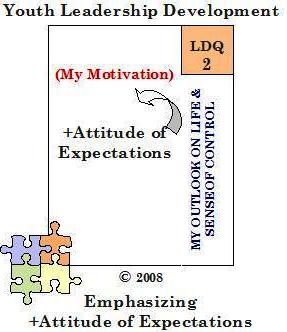|
Developing an Attitude of Expectations

+Attitude of Expectations (My Motivation)
This is our working definition:
An +Attitude of Expectations is the possession of a positive frame of mind in the expectation, planning, visualization, commitment, and anticipation of highly desirable future events of significant proportions. It is a confident state of mental preparedness and readiness in embracing the anticipated impending fulfillment of a significant life event or personal goal.
The synonyms for a +Attitude of Expectations are:
Positive Expectations, Positive Anticipations, Readiness to Embrace, Desired Anticipations, Desired Outcomes
What is an Attitude of Expectations?
An +Attitude of Expectations is a strong and confident state of positive mental readiness in anticipation of the desirability of engaging in a series of impending life events. We can also describe it as follows. An +Attitude of Expectations is the end result of an ongoing conversation you have with yourself about your feelings, beliefs, and attitudes regarding how ready, capable, and competent you are to take on new life challenges and opportunities.
That conversation is strongly influenced by the total quantity and quality of the +Self-Esteem and +Self-Confidence that you have acquired in your life up until now. Depending on your self-concept and appraisal of the level of your achievements, and those validated by others, this "conversation with self" can go one of two ways. Look for the underlying direction of the attitude. For example, I Feel Ready Now/Not Ready Now to Take on New Challenges and Goals because...(listen carefully for the reason why).
Obviously in the "Not Ready Now Because" of the Attitude of Expectations examples given, there is a need for more developmental work in strengthening Self-Esteem and in building Self-Confidence. This leadership candidate is more appropriately categorized as a "Leadership Apprentice", than as an "Aspiring Peer Leader".
There is work to be done in order to build a stronger Self-Confidence, and a much greater degree of "Belief in Self". Perhaps there is also an issue or an obstacle regarding a shortfall in the requisite skills or abilities needed to achieve the next goal or opportunity.
While we prefer to characterize attitude as a positive influence, there is also the possibility that a poor motivation, or negative attitude can sometimes be the wet blanket on the desire to achieve more or live up to what one is fully capable of doing or becoming in life. Because each person is unique, a number of things can be having an influence. There are seldom simple one-factor cause and effect connections that describe just one reason for observed behavior. We should always resolve to consider all of the possibilities. Life experiences frequently teach us to look to the root causes for the real answers/solutions.
How do You Assess the Presence of an Attitude of Expectations?
For the answer to this question, let us focus only on the "Ready Now Because" column of comments you might hear from an aspiring youthful leader. Let's now "categorize them 1 to 4" with the following points of evaluation as they apply to the Personality Characteristics we have discussed thus far:
- SELF-ESTEEM (precursor to an Attitude of Expectations)
Are there Insights or Evidence of the Following?
- Has developed and demonstrates a strong +Self-Esteem and a healthy self-concept that is validated by others and measured by his pride and acceptance of himself.
- Has achieved a positive personal self-appraisal of his opinion of his intrinsic value.
- Has a sense of his relative competence and worthiness vs. others.
- SELF-CONFIDENCE (precursor to Attitude of Expectations)
Are there Insights or Evidence of the Following?
- Has developed a healthy +Self-Confidence based upon self-validated self-assurance; relative freedom from doubt.
- Has a belief in himself and his abilities to the point of trusting and relying on himself as he interacts with others.
- Self-Confidence provides his drive and energy, and it is manifested in his ability to succeed by overcoming obstacles, and in taking on difficult and challenging goals.
- ATTITUDE OF EXPECTATIONS - MY MOTIVATION
Are there Insights or Evidence of the Following?
- Displays the motivation to act that comes from a belief in self and by engaging in the demonstration of a +Attitude of Expectations in the anticipation, visualization, planning, commitment, and completion of future events of significant proportions. "Yes, I Can Do It!"
Where Does an Attitude of Expectations Come From, and Why is it Important?
A belief in self, nurtured by a strong +Self-Esteem and a healthy +Self-Confidence, gives rise to the mind set of an Attitude that one can and should do more and is worthy of achieving more. Therefore, this Attitude encourages the Expectation that it is possible to set challenging life goals with a high probability of success in their achievement. The Attitude shifts decidedly to one of expecting to win, to achieve important personal goals and to succeed in life.
We have made the point several times that strong +Self-Esteem gives the impetus for the development of a good Self-Concept. This, in turn, stimulates a Belief in Self and helps contribute to a healthy +Self-Confidence that is built upon a significant number of personal accomplishments and achievements.
We have also emphasized that these two Personality Characteristics are precursors or antecedents to the formation of a positive +Attitude of Expectations. At the risk of oversimplifying, it is pretty much like it was in the movie Field of Dreams - "Build it and they will come!" In this case it will come if you first build +Self-Esteem and then use that to build +Self-Confidence, then move on to nurture an +Attitude of Expectations.
Note the impact of the four Leadership Core Values also comes in for a strong influence in this process. The values of Responsibility and Achievement play a particularly prominent role, and Integrity and Courage a strong supporting role.
| 
